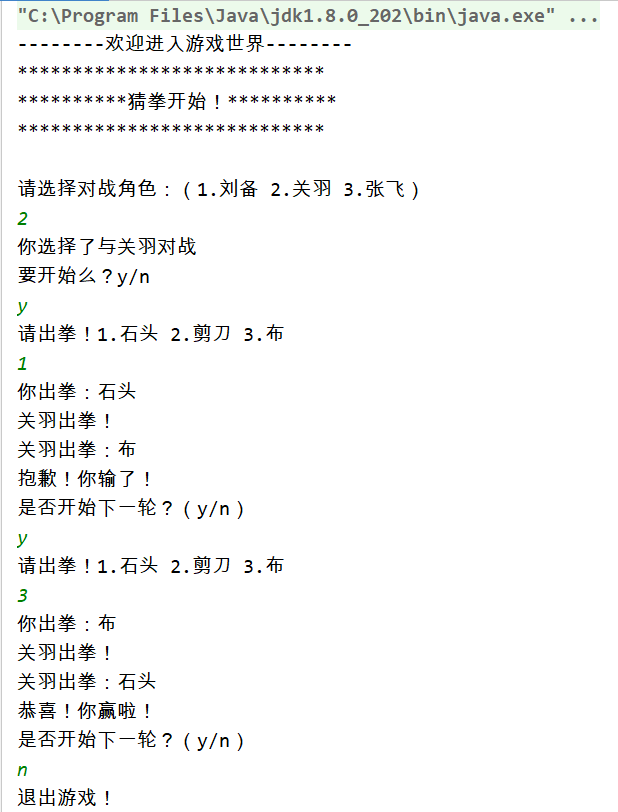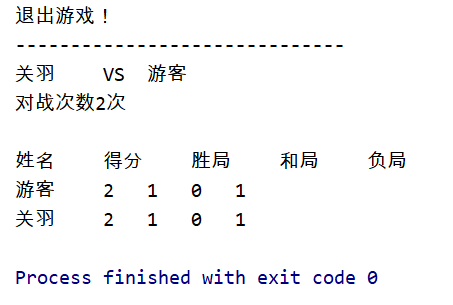第一题、百元喝酒
作业要求:每瓶啤酒2元,3个空酒瓶或者5个瓶盖可换1瓶啤酒。100元最多可喝多少瓶啤酒?(不允许借啤酒)
思路:利用递归算法,一次性买完,然后递归算出瓶盖和空瓶能换的啤酒数
package com.lagou.homework
/**
* 作业要求:每瓶啤酒2元,3个空酒瓶或者5个瓶盖可换1瓶啤酒。100元最多可喝多少瓶啤酒?
* (不允许借啤酒)思路:利用递归算法,先一次性买完,然后递归算出瓶盖和空瓶能换的啤酒数
*/
object HundredBeer {
def main(args: Array[String]): Unit = {
var bottle, cap, bcsum: Int = 100 / 2
bcsum = bottleAndCap(bcsum, bottle, cap)
println("100元能喝的啤酒数量是:" + bcsum)
}
/**
* 定义一个递归函数,实现瓶子和盖子替换的啤酒数量
*/
def bottleAndCap(sum: Int, b: Int, c: Int): Int = {
if (b < 3 && c < 5) {
return sum
} else {
var a1: Int = b / 3
var a2: Int = b % 3
var b1: Int = c / 5
var b2: Int = c % 5
return bottleAndCap(sum + a1 + b1, a1 + b1 + a2, a1 + b1 + b2)
}
}
}
运行结果

第二题、人机猜拳
1.1 作业需求
1. 选取对战角色
2. 开始对战,用户出拳,与对手进行比较,提示胜负信息
3. 猜拳结束算分,平局都加一分,获胜加二分,失败不加分
4 . 循环对战,当输入“n”时,终止对战,并显示对战结果
5. 游戏结束后显示得分
1.2 作业分析
分析业务逻辑,抽象出类、类的属性和方法,如下:
1. 创建用户类User,定义类的属性(name,score)和类的方法(showFist())
2. 创建计算机类Computer,定义类的属性(name,score)和类的方法(showFist())
3. 实现计算机随机出拳
4. 创建游戏类Game,定义类的属性(甲方玩家、乙方玩家、对战次数)
5. 编写初始化方法、游戏开始方法
代码详解
package com.lagou.homework import scala.io.StdIn object GameDemo { //定义变量 val AIplayer = Map("1" -> "刘备", "2" -> "关羽", "3" -> "张飞") val fist = Map("1" -> "石头", "2" -> "剪刀", "3" -> "布") var user: User = _ var computer: Computer = _ var times = 0 /** * 开局之前的准备 */ def init(): Unit = { println("--------欢迎进入游戏世界--------") println("****************************") println("**********猜拳开始!**********") println("**************************** ") // 用户的角色 user = new User("游客", 0) // 用户选择的对战角色 println("请选择对战角色:(1.刘备 2.关羽 3.张飞)") val key = StdIn.readLine() computer = new Computer(AIplayer(key), 0) } /** * 比赛逻辑比对 */ def judge(ares: String, bres: String): Unit = { if (ares == bres) { // 平局 user.score += 1 user.fairs += 1 computer.score += 1 computer.fairs += 1 } else if ((ares == "1" && bres == "2") || (ares == "2" && bres == "3") || (ares == "3" && bres == "1")) { // 玩家赢 user.score += 2 user.wins += 1 computer.fails += 1 println("恭喜!你赢啦!") } else { // 玩家输 computer.score += 2 computer.wins += 1 user.fails += 1 println("抱歉!你输了!") } } /** * 显示对战结果 */ def showResults(): Unit = { println(s"${computer.name} VS ${user.name}") println(s"对战次数${times}次 ") println("姓名 得分 胜局 和局 负局") println(s"${user.name} ${user.score} ${user.wins} ${user.fairs} ${user.fails}") println(s"${computer.name} ${computer.score} ${computer.wins} ${computer.fairs} ${computer.fails}") } /** * 程序入口 */ def main(args: Array[String]): Unit = { // 初始化对战页面 init() // 开始对战 println(s"你选择了与${computer.name}对战 要开始么?y/n") var next = true var s = StdIn.readLine() do { s match { case "y" => { println("请出拳!1.石头 2.剪刀 3.布") var ares = user.showFist() println(s"${computer.name}出拳!") var bres = computer.showFist() // 判断结果 judge(ares, bres) times += 1 println("是否开始下一轮?(y/n)") s = StdIn.readLine() } case "n" => { // 终止对战并显示结果 next = false println("退出游戏!") println("------------------------------") showResults() } case _ => { println("是否开始下一轮?(y/n)") s = StdIn.readLine() } } } while (next) } }
User类
package com.lagou.homework import scala.util.Random class Computer(var name: String, var score: Int) { var wins = 0 var fails = 0 var fairs = 0 val fist = Map("1" -> "石头", "2" -> "剪刀", "3" -> "布") def showFist(): String = { val bres = Random.nextInt(3) + 1 println(s"${name}出拳:${fist(bres.toString)}") bres.toString } }
Computer类
package com.lagou.homework import scala.io.StdIn class User(var name: String, var score: Int) { var wins = 0 var fails = 0 var fairs = 0 val fist = Map("1" -> "石头", "2" -> "剪刀", "3" -> "布") //出拳 def showFist(): String = { var ares = StdIn.readLine() if (!fist.keySet.contains(ares)) { println("输入不符合规范,默认出布!") ares = "3" } println(s"你出拳:${fist(ares)}") ares } }
演示结果


第三题、用户位置时长统计
现有如下数据需要处理:
字段:用户ID,位置ID,开始时间,停留时长(分钟)
4行样例数据:
UserA,LocationA,8,60
UserA,LocationA,9,60
UserB,LocationB,10,60
UserB,LocationB,11,80
样例数据中的数据含义是:用户UserA,在LocationA位置,从8点开始,停留了60钟
处理要求:
1、对同一个用户,在同一个位置,连续的多条记录进行合并
2、合并原则:开始时间取最早时间,停留时长累计求和
代码详解
package com.lagou.homework //定义一个样例类 case class userTime(username: String, location: String, startTime: Int, duration: Int) object UserLocation extends App { // 将数据封装到样例类中,初始化数据到集合 val userTimeLst: List[userTime] = List( userTime("userA", "locationA", 8, 60), userTime("userA", "locationA", 9, 60), userTime("userB", "locationB", 11, 80), userTime("userB", "locationB", 10, 60) ) // 分组,key为姓名加位置,确定唯一,算子为groupBy val groupuserTime: Map[String, List[userTime]] = userTimeLst.groupBy(user => user.username + "-" + user.location) println("分组") groupuserTime.foreach { case (k, v) => println(s"key:$k, value:$v") } // 排序,根据开始时间顺序,算子为mapValues val sortuserTime: Map[String, List[userTime]] = groupuserTime.mapValues(_.sortBy(_.startTime)) println("排序") sortuserTime.foreach { case (k, v) => println(s"key:$k, value:$v") } // 统计,算子为mapValues,最终计算出不同组里的连续的开始时间的最终停留时长,原始数据不存在不连续,不考虑不连续 var firstTime = 0 val sumuserTime: Map[String, Int] = sortuserTime.mapValues(lst => { // 返回开始时间 firstTime = lst.head.startTime // 返回总停留时长 lst.map(_.duration).sum }) println("最终") // 输出最终结果 sumuserTime.foreach { case (k, v) => println(s"key:$k, 开始时间:$firstTime, value:$v") } }
结果验证
